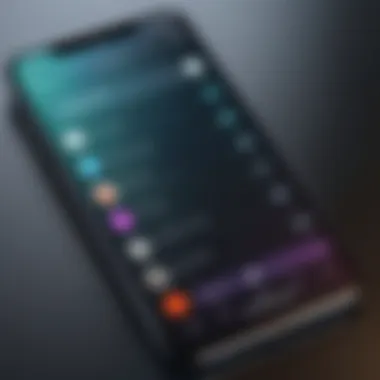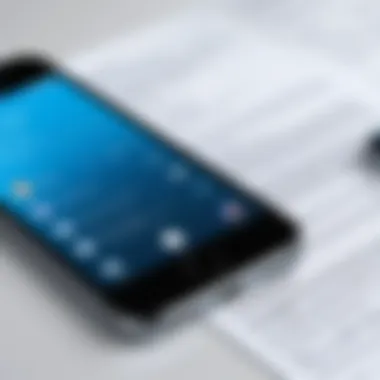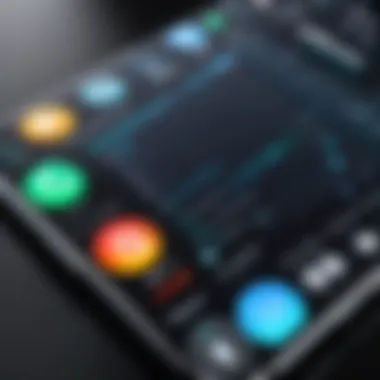Exploring Phone Conversation Recorder Apps: A Comprehensive Guide


Intro
Phone conversation recorder apps have gained attention in recent years. With the rise of remote work and virtual communication, these tools provide significant utility. They offer an effective way to capture conversations for future reference. The applications can serve various industries, allowing professionals to focus on discussions without the stress of note-taking.
This guide aims to explore these applications thoroughly. IT professionals and tech enthusiasts will find valuable insights into the functionality of these tools. As we dive into the scope of phone conversation recorder apps, we will cover critical aspects such as legal considerations, technical features, and practical applications across different fields. By the end of the article, readers should have a thorough understanding of how to leverage these apps in their communication and documentation processes.
Product Overview
Phone conversation recorder apps come with a variety of features designed to enhance the user experience. Their primary function is to capture audio from phone calls, but they also offer many secondary features.
Key Features
- High-Quality Recording: Many apps provide crystal-clear audio quality, ensuring that every word is captured accurately.
- Cloud Storage: Some applications allow automatic uploading of recordings to cloud storage services. This feature provides easy access and retrieval of conversations without occupying device memory.
- Privacy Controls: Security features like password protection and encryption are essential. These ensure that sensitive conversations remain confidential.
- Editing Tools: Users can edit recordings within the app to highlight important segments or remove extraneous noise.
- Sharing Options: Many apps offer built-in sharing capabilities, allowing users to send recordings via email or messaging platforms.
Technical Specifications
Most modern phone conversation recorder apps require current mobile operating systems. Common features include:
- Compatible Operating Systems: iOS and Android
- Storage Requirements: Typically, between 50 MB to 250 MB depending on features
- Internet Connectivity: Required for cloud storage and sharing options
- Battery Usage: Varies significantly, though optimally designed apps minimize drainage
Performance Analysis
To evaluate the effectiveness of different phone conversation recorder apps, performance analysis is critical. This can highlight how well these tools deliver on their promises.
Benchmark Test Results
When testing, various applications were assessed on metrics like voice clarity, ease of use, and additional features. For example, some popular apps scored highly for simplicity in navigation while others excelled in audio quality.
Real-World Usage Scenarios
Users rely on these apps in different contexts. For instance:
- Business Meetings: Recording discussions helps keep track of decisions and action points.
- Interviews: Journalists use apps to document interviews accurately without missing critical information.
- Customer Service: Organizations utilize call recording to improve service quality and training.
Thus, phone conversation recorder apps provide substantial benefits in real-world applications. They serve not only to document conversations but also to enhance communication efficiency across various sectors.
Preface to Phone Conversation Recorder Apps
The rising demand for effective communication tools has led to the prominence of phone conversation recorder apps. These applications promise not only convenience but also a new approach to documentation. They serve critical roles in various fields, including business, healthcare, and education. Understanding their function and implications is essential for IT professionals and tech enthusiasts.
Defining Phone Conversation Recording
Phone conversation recording refers to the process of capturing and storing voice communication during phone calls. These recordings can be audi files that are saved for future reference. The technologies underlying these apps vary, ranging from software solutions to hardware integrations. Some apps record conversations directly on smartphones, while others may require external devices. The purpose behind recording can be multifaceted, from compliance and record-keeping to personal memory aids.
Historical Context and Evolution
The concept of recording conversations isn't new. Early recording devices date back to the late 19th century, using mechanical methods. With the advent of digital technology, the process became more refined. The shift to mobile technology was pivotal in making recording accessible to a broader audience.
In the past, specialized hardware was necessary for recording phone conversations, which limited usage to specific contexts. Today, smartphone applications facilitate recording with just a few taps, offering both simplicity and efficiency. The evolution of this technology showcases rapid advancements in user-friendliness as well as import of legal compliance. As technology continues to advance, the features and functionalities of these apps are likely to expand, addressing growing user needs within various industries.
How Phone Conversation Recorders Function
Understanding how phone conversation recorders work is crucial for anyone considering their use. This knowledge not only provides insights into the effectiveness of such apps but also allows users to make informed decisions about their selection and implementation. Phone conversation recorders employ a variety of technologies to capture audio data during calls, which can serve multiple functions, from documentation to immediate recall of conversations.
Technical Mechanisms Behind Recording
Phone conversation recorder apps function based on a set of technical mechanisms that facilitate the recording of voice in real-time. These apps utilize the phone's built-in microphone or external audio inputs to capture sound waves while the call is ongoing. The core of their functionality resides in the operating system capabilities.


Most modern smartphones have APIs (Application Programming Interfaces) that allow apps to access call audio. These APIs are tightly regulated due to privacy concerns. When a call is initiated, the app may activate the microphone, capturing the audio streamed both ways. The recorded audio is then converted into a digital format. This involves the use of codecs that compress the audio data without significant loss of quality. The data is then saved on the device storage or sent to a secure cloud environment for later access.
Types of Recording Technologies
There are several recording technologies that app developers may employ to create functionality for phone conversation recorders. These include:
- VoIP (Voice over Internet Protocol): These apps, such as Skype or Zoom, can natively record conversations because they operate over the internet. They process audio as digital packets, making it easier to capture and store conversations.
- Call Merging: Some recording apps operate by creating a three-way call where one of the parties is a recording service. This method can be slightly more complex, as it requires the consent of all participants due to legal implications.
- Native System Recording: Certain smartphone models have built-in recording features within the dialer app. This allows recording without the need for third-party apps.
- External Microphones: For higher quality recordings, external microphones can be used alongside the app. This tends to improve audio clarity, especially in noisy environments.
"Understanding the various technologies behind phone conversation recorders is vital for effective use and compliance with legal regulations."
The choice of technology depends on the intended use and specific requirements of the user, balancing convenience and quality. Each of these technologies has unique attributes that can significantly affect the user experience. As such, it's crucial to consider them when deciding on an app for recording phone conversations.
Legal Considerations in Using Recording Apps
Understanding the legal landscape surrounding phone conversation recording is paramount for anyone utilizing these apps. The potential for legal repercussions looms over misuse or misunderstanding of recording laws. This section aims to elucidate these considerations, emphasizing the necessity of compliance with regional laws, which can vary significantly by jurisdiction. Informed users not only protect themselves but also uphold ethical standards that foster trust and credibility.
Understanding Consent Laws
Consent laws form the backbone of the legal framework governing phone conversation recordings. In many jurisdictions, these laws dictate whether one or both parties in a conversation must provide consent before a recording can lawfully take place.
- One-party consent: In most states in the USA, only one participant needs to consent to the recording. This means if you are part of the conversation, you may record without informing the other person.
- All-party consent: Conversely, certain states and countries, like California and Canada, require all participants to agree before any recording occurs. Recording without explicit consent can lead to serious legal consequences.
The penalties for violating these consent laws can vary. Offenders may face civil lawsuits and, in severe instances, criminal charges. Therefore, before using a phone conversation recorder app, it is crucial to familiarize oneself with the specific laws applicable to the user’s location and the location of the individuals involved in the call.
Implications of Illegal Recording
Recording conversations without appropriate consent can have wide-ranging implications. Engaging in illegal recording practices can result in:
- Financial penalties: Victims of illegal recordings have the right to seek compensation for damages, leading to costly settlements and legal fees.
- Reputational damage: Businesses and individuals found to be recording calls illegally may suffer significant reputational harm. Trust, once broken, can be difficult to restore.
- Criminal charges: In some jurisdictions, unauthorized recording can result in misdemeanor or felony charges, which carry serious penalties including jail time.
It's essential to ask for consent before recording a conversation, not just to adhere to laws but to support ethical practices in communication.
In summary, understanding and adhering to consent laws is crucial in the utilization of phone conversation recorder apps. Users must be aware of the potential consequences of illegal recording, both for their well-being and the integrity of their communications.
Applications of Phone Conversation Recording
The utility of phone conversation recording applications extends far beyond mere documentation. In various sectors, these tools are integral and serve distinct purposes. Understanding the applications helps users maximize the benefit and functionality of recording technology. This section explores notable industries that leverage recording apps and highlights the specific needs they fulfill.
Business Use Cases
In the business arena, the effectiveness of communication is essential for preserving clarity and accountability. Phone conversation recording apps enable organizations to document important discussions, ensuring that key points are preserved for reference. One prevalent use case is in customer support. Call centers use these tools to train new employees, monitor service quality, and resolve disputes. Additionally, recording conversations for compliance purposes can aid businesses in adhering to industry regulations.
The integration of features such as tagging and easy retrieval of recording can enhance operational efficiency. Businesses benefit when meetings, negotiations, and strategy discussions are recorded. This means information is not lost to memory differences and misunderstandings.
Healthcare and Patient Documentation
The healthcare sector has a unique requirement for recording phone conversations due to the sensitive nature of patient information. Recording patient calls can enhance documentation processes, improve communication with patients, and ensure proper follow-up. This function is pivotal for maintaining accuracy in patient records, especially when discussing treatment plans or medication instructions.
Moreover, recordings can facilitate better communication among healthcare professionals. For instance, it allows doctors to refer back to patient consultations quickly. Accurate documentation is not only a practice improvement but may also be vital for legal protection. The persistence of audio records can support healthcare providers in case of disputes or misunderstandings.
Educational Purposes
Recording applications also find a place in the educational sector. Both students and teachers use recording apps to enhance learning experiences. For learners, having access to recorded lectures can aid in comprehension and retention. Students can revisit complex topics or take notes more effectively by listening to discussions multiple times.
From an instructional standpoint, educators can use recordings to evaluate their teaching methods. This feedback loop allows for improvements in course delivery. Furthermore, collaborative projects can benefit; teams can record their brainstorming sessions to track ideas and decisions over time.
In summary, the applications of phone conversation recording are vast and varied across industries. Each sector presents unique challenges and benefits, illustrating the importance of understanding the needs and implications of using recording technology. As more professionals adopt these tools, their role in effective communication will undoubtedly grow.


Evaluating Key Features of Recording Apps
Understanding the critical features of phone conversation recorder apps is essential. This section is designed to clarify how these features impact user experience, application functionality, and overall effectiveness. There are several elements that you should consider when evaluating these apps. A systematic approach can guide you in selecting the most suitable app for your needs.
User Interface and Usability
The user interface is the first point of interaction for any app. A well-designed interface can significantly enhance usability. When considering an app, focus on its layout and design. Is it intuitive? Can users navigate through the functions with ease?
For instance, simplicity should prevail. Irrelevant elements may distract, leading to user frustration. Well-organized menus and clear instructions are vital. Additionally, look for features that support accessibility. This might include voice commands or adaptive strategies for individuals with different abilities. Usability directly correlates to how efficiently users can record and retrieve conversations.
"A user-friendly design can increase productivity while minimizing the learning curve associated with new technology."
Storage and File Management
Storage capabilities determine how much audio data can be saved. It is crucial to evaluate the app’s storage options. Does it offer cloud storage alongside local options? This flexibility can enhance accessibility, especially for users who require on-the-go access to recorded conversations.
In terms of file management, consider how recordings are organized and retrieved. Users should have the ability to categorize recordings, perhaps by date or topic. Additionally, search functionality is paramount. The quicker users can find specific conversations, the more efficiently they can use the app.
Export Options and Integration
As businesses and individuals seek seamless workflows, export options become increasingly important. An effective recording app should allow easy exporting of audio files. Look for formats that are standard, such as MP3 or WAV. Some apps also permit direct integration with communication tools like email or cloud services such as Google Drive or Dropbox.
Such integrations simplify sharing recorded conversations. Being able to send audio files directly from the app can save valuable time. If the app connects smoothly with other platforms, it can significantly enhance your overall user experience.
Top Phone Conversation Recorder Apps Reviewed
The importance of reviewing top phone conversation recorder apps cannot be understated, especially in an era where effective communication is paramount. Users must understand the functionality and features that distinguish one app from another. By creating a detailed comparison, users can make informed choices that align with their specific needs. This section serves as a critical examination of leading apps in the market, providing insights that can guide both IT professionals and tech enthusiasts.
App Comparison Framework
In this comparison, we assess various critical aspects of phone conversation recorder apps. Key criteria include:
- User Interface: How intuitive and user-friendly the app is.
- Recording Quality: The audio clarity and fidelity of recorded conversations.
- Storage Options: How recordings can be stored and managed.
- Export and Sharing: The ease with which recordings can be exported to other platforms.
- Compatibility: The devices and operating systems supported by the app.
This framework allows potential users to prioritize features that are most relevant to their situations, ensuring they select an app that meets their requirements efficiently.
In-depth Reviews: Leading Apps
App A Review
App A stands out for its robust set of features tailored for professional use. Its primary contribution to the overall topic lies in its seamless recording capabilities, especially in challenging environments. The key characteristic that sets App A apart is its noise cancellation feature, which significantly enhances call clarity. This app is a popular choice for professionals who rely on precise documentation of conversation. One unique feature is its ability to integrate with cloud storage providers, offering users easy access and sharing solutions.
However, some users have reported occasional issues with compatibility on older Android devices, which could limit its audience in some cases.
App B Review
App B is designed for a user base that values simplicity alongside function. This app's contribution to the overall goal of effective conversation recording is its emphasis on easy setup and operation. A key characteristic is its one-touch recording feature that facilitates quick usage, making it ideal for on-the-go individuals.
One particularly advantageous feature is its automatic transcription service, which converts spoken words into text. This can be especially useful for users who need to capture details rapidly. However, some users might find the transcription accuracy varies based on ambient noise levels during recording.
App Review
App C focuses on security and privacy, appealing to users in sensitive industries. Its contribution to the topic is critical in our current landscape where data security is paramount. A key characteristic of App C is its end-to-end encryption for recorded conversations. This ensures that sensitive information remains secure.
Unique features include session password locks and the ability to set expiration dates on recordings. These benefits make App C suitable for professionals handling confidential data. Nonetheless, its advanced features sometimes come at the cost of usability, with users reporting a steeper learning curve compared to other apps.
Evaluating these applications provides not just a list of features, but a strategic understanding of how each can be applied to different needs.


By thoroughly understanding these leading apps, users can navigate their choices in the evolving landscape of phone conversation recording technology.
Challenges and Limitations of Recording Apps
The growing reliance on phone conversation recording apps has sparked discussions regarding their challenges and limitations. It is crucial to recognize these factors when considering their use. Despite their popularity, recording apps are not without flaws. These challenges can affect the reliability of recording, user experience, and legal compliance. Understanding these limitations helps users make informed decisions and enhances the effectiveness of the technology.
Technical Limitations
Technical limitations often pose significant obstacles when using phone conversation recorder apps. One of the primary concerns is the issue of audio quality. Factors such as background noise, network interruptions, and device compatibility can adversely affect recording clarity. Some apps may not work optimally on all phones, leading to inconsistent performance.
Furthermore, battery usage is another technical consideration. Continuous recording can drain the battery rapidly, specifically on older devices. Users need to balance the recording duration with the available battery life. This may require users to ensure they operate on devices with larger batteries or available charging sources.
Compatibility with both Android and iOS is also essential. Some features may be available on one platform but not the other. Variances in app updates can potentially create discrepancies. This can result in the loss of essential functionalities and hinder the user experience.
Ethical Concerns
The ethical concerns surrounding phone conversation recording apps are equally vital. Different jurisdictions have various laws about recording conversations, primarily focusing on consent. Not abiding by these regulations can lead to severe consequences, both legally and ethically. Users who record conversations without proper consent risk violating privacy rights, which raises questions about personal integrity and respect for counterparties.
Moreover, there are ethical implications of how recorded data is handled. The risk of misuse of recorded conversations is high, especially if the data is stored unencrypted or handled by unauthorized personnel. The potential for data breaches raises alarm regarding privacy, which is an increasingly sensitive issue in today's digital age.
"The integrity of recorded content and adherence to ethics is just as important as the technology itself."
Indeed, understanding ethical considerations is fundamental for users of recording apps. It is essential to engage in practices that honor the privacy and rights of individuals involved in the conversations. Awareness and adherence to ethical standards can help mitigate some risks inherent in using these technologies.
Future Trends in Phone Recording Technology
Understanding the future trends in phone recording technology is essential. It provides insight on where this field is heading. The evolution of technology influences usability and capabilities of recording apps. These trends will enhance both the user experience and the effectiveness of recordings in various sectors.
Advancements in AI and Machine Learning
The role of artificial intelligence (AI) and machine learning in recording technology cannot be overstated. These technologies enable smarter applications that learn from user behavior. Future apps may offer features like automatic transcription, where spoken words convert into text in real time. This can save time and increase the efficiency of documentation.
Moreover, AI can improve voice recognition systems. It will adapt to different accents and speech patterns, ensuring accuracy in recordings. It helps in filtering background noise, enhancing audio quality. These advancements make it easier to capture important conversations without distractions. Such improvements demonstrate the potential for AI to revolutionize how we use phone conversation recorders.
Emerging Features and User Preferences
As technology evolves, user preferences also shift. Future phone recording apps will likely integrate more user-friendly features. This includes cloud storage options for easy access and backup of recordings. Users prefer apps that offer seamless integration with other tools for sharing and editing.
Security is a key focus too. With growing concerns over privacy, developers are enhancing encryption methods. Users want assurance that their recordings are safe from unauthorized access. Features such as password protection and two-factor authentication could be popular in the future.
In addition, customization will become vital. Users may seek the ability to tailor apps to their specific needs. This can include customizable interfaces or options for organizing recordings. Developers must stay attuned to these changes to create applications that meet evolving demands.
"The future of phone recording technology is a blend of innovation and user-centric design."
As the landscape of phone recording continues to change, staying informed will be crucial for IT professionals and tech enthusiasts alike.
Finale: Evaluating the Role of Recording Apps in Communication
In contemporary communication practices, the significance of phone conversation recorder apps cannot be overstated. These applications serve a crucial purpose in various contexts from business meetings to personal conversations. Recording conversations helps in maintaining accurate records, ensuring compliance with legal regulations, and enhancing communication efficiency. As the digital landscape evolves, these tools have become indispensable in fostering clarity and accountability, especially in professional settings.
The fluids of technology have reshaped how conversations are documented and analyzed. Thus, understanding the implications and functionality of such recording apps is essential for IT professionals and tech enthusiasts alike. Various domains capitalize on these apps for their unique benefits. From providing training resources in businesses to aiding healthcare professionals in maintaining patient records, the application of phone recording technology is extensive.
Summarizing Key Takeaways
- Functionality: Phone conversation recorder apps provide effective means to capture and analyze discussions. Their abilities to automatically save audio files for later retrieval enhance overall utility.
- Legal Aspects: Knowledge of legal implications, such as consent laws, is paramount. Users must ensure compliance to avoid legal repercussions.
- Technological Integration: Modern recording apps often allow seamless integration with other applications, promoting efficient workflows.
- Potential Applications: Use cases span various industries including business for meetings, healthcare for patient documentation, and education for lectures.
This summation reiterates the necessity of these recording tools while highlighting their multifaceted role within the spheres of professional communication.
Final Thoughts on Utility and Legality
The utility of phone conversation recorder apps extends beyond basic recording functionality. They empower users with improved communication documentation and serve as reliable resources for future reference. Nevertheless, the legality surrounding their use introduces a layer of complexity that users must navigate carefully.
Recording conversations without proper consent could lead to severe legal consequences. Each user should stay well-informed about the laws relevant to their jurisdiction. As technology advances, it invites the evolution of consent laws, making it imperative to remain updated on these changes.
"Knowledge of legal implications, such as consent laws, is paramount."



